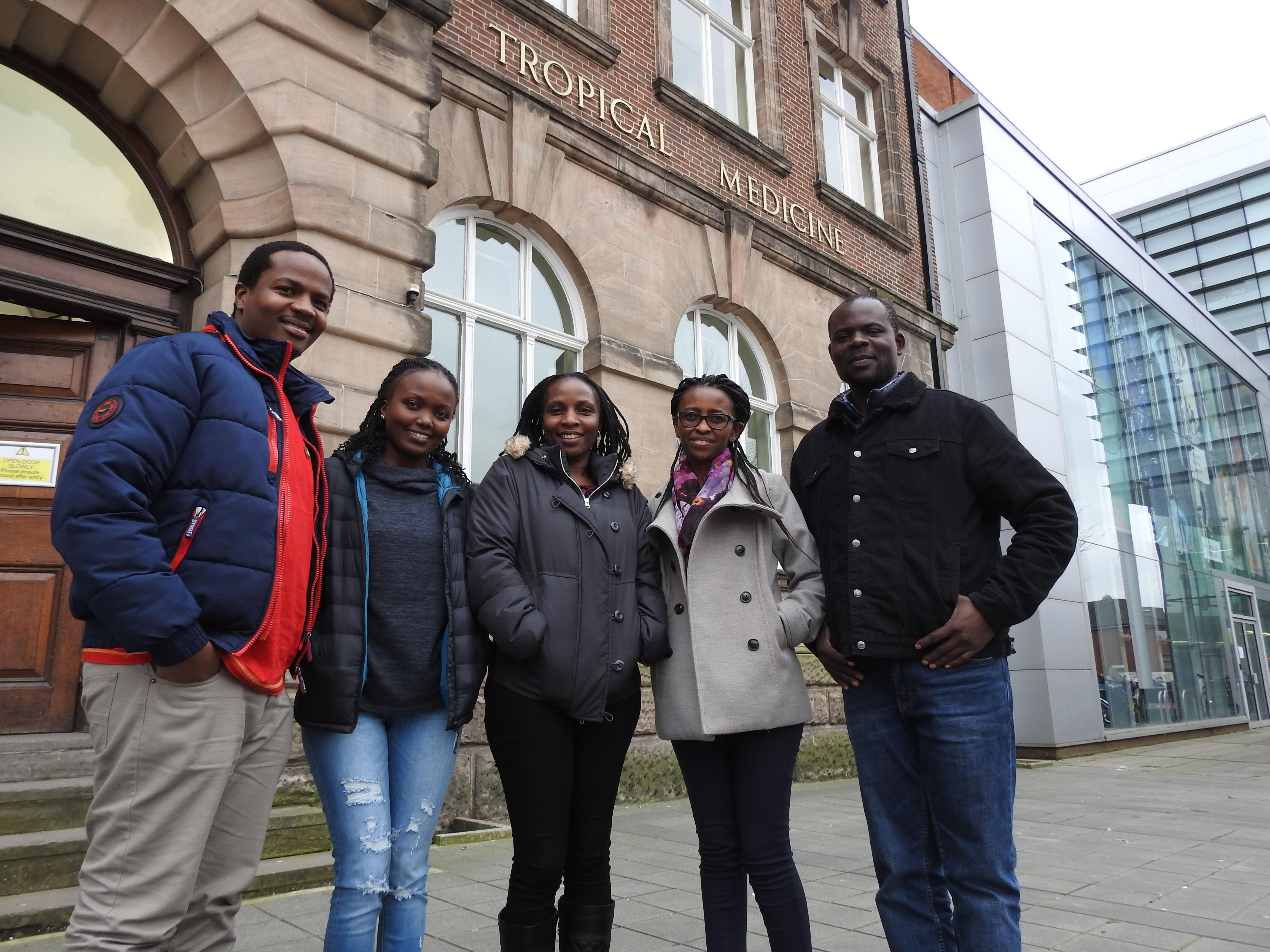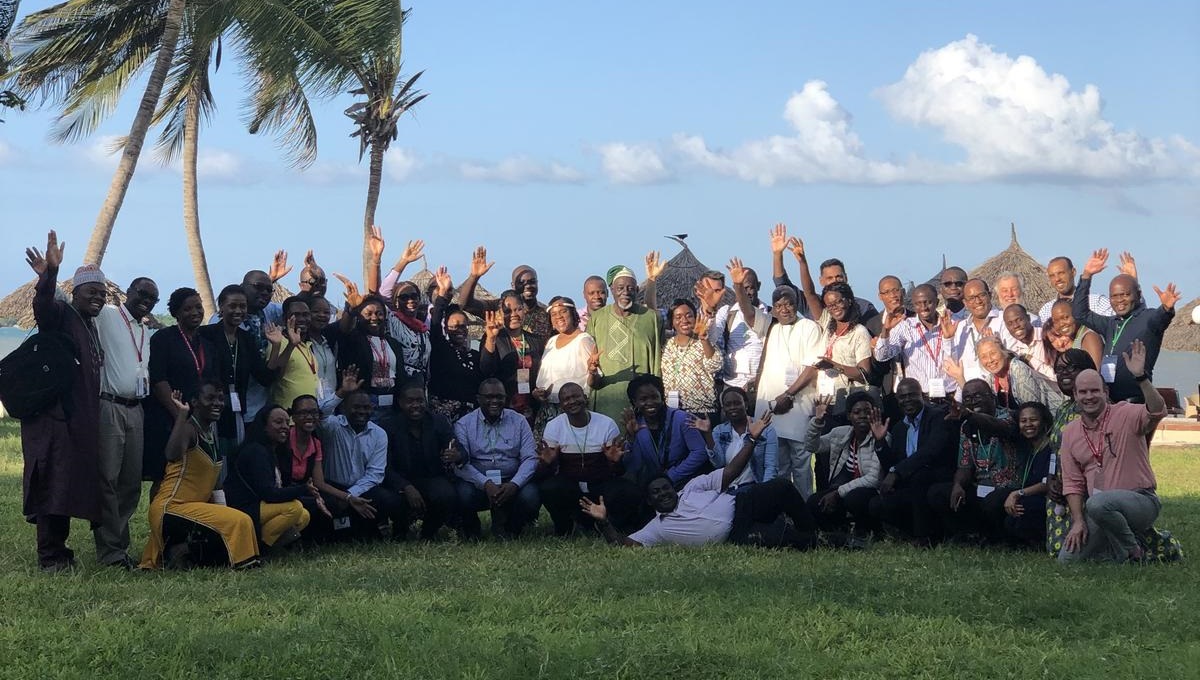
PhD Students
The Unit is investing strategically in building capacity and capability through 5 PhD studentships for African students, adding value to the existing LSTM-led MRC funded Doctoral Training Programme in Global Health. The 5 PhD students will benefit from a structured training programme offered within supportive environments with established management and governance structures for high quality supervision and mentoring.
The PhD students are:
Brenda Mungai
Irene Ayakaka
Jacqueline Kagima
Martin Njoroge
Stephen Mulupi
Post-Doctoral Researchers
The Unit has also recruited 5 post-doctoral scientists based in LMIC partner organisations or at LSTM. Strengthening LMIC partner research infrastructure and individuals’ skills at all levels will help ensure future sustainability of investments in capacity and capability.
The PDRAs are:
Elizabeth Shayo
Rebecca Nantanda
Uzoh Egere
Yan Ding
Zelalem Terfa
PATS MECOR

PATS-MECOR comprises face to face 1 week courses to provide intensive short training to strengthen skills and build capacity for clinical and epidemiological research in lung health in Africa. The course has different levels through which students may be progress starting at level 1 and ending at level 3.The Pan African Thoracic Society – Methods in Epidemiologic, Clinical and Operations Research (PATS-MECOR) course.
The course was initiated by Professor Stephen Gordon of the Liverpool School of Tropical Medicine (LSTM) and is based on the successful American Thoracic Society (ATS) MECOR programme. The specific needs identified for the course in Africa were:
- Insufficient capacity to collect and interpret country/local specific data,
- Insufficient understanding of research appraisal of the literature, and most critically,
- Insufficient numbers of public health, academic, and clinical leaders to support and facilitate research and its application to public health and health care related to respiratory diseases and critical care medicine.
The course is designed for pulmonary clinicians, investigators, and academicians to provide training in research methods. Three workshops run concurrently for a period of one week each year.
Level 1: Measuring the Burden of Disease – during level 1 training workshops students learn how to develop a study plan, choose the study subjects, plan measurements and prepare and estimate sample size and protocol development. No prior research experience is required for level 1
Level 2: Advanced Clinical Research Methods - Students learn about study designs, such as, Experimental, Observational cross-section, Observational case-control and how to research data. Students must have attended level 1 to progress to level 2.
Level 3: Further research skills, grant and paper writing – Students bring details of a draft paper and research question that they would like to work on at Level 3. The training workshops address ethical issues, designing questionnaires, interviews and on-line surveys, as well as, data management, quality control and writing a proposal for funding research. To be accepted on to level 3 students must be able to demonstrate how Level 1 & 2 PATS MECOR courses have advanced their research career.
The first workshop was held in Blantyre, Malawi in 2007 and continued to be delivered there until 2009. From 2010 to 2015 the course was held at Brackenhurst International Conference Centre, Limuru, Kenya were the programme received invaluable support from the Kenya Medical Research Institute (KEMRI). In 2016 the course returned to Malawi and was held at the College of Medicine (CoM), Blantyre supported by staff at the Malawi Liverpool Wellcome Trust (MLW).
With support from IMPALA, LuLi and the Aldama Foundation a further two PATS MECOR courses were held in Durban, South Africa from the 16th - 20th April 2018 (39 students attended and completed their level) and in Dar es Salaam, Tanzania from 10th-14th June 2019 (36 students attended and completed their level).
AFIDEP Policy Engagement and Evidence Uptake Training
29 Jan – 2 Feb 2018 Liverpool
This training programme was one component of the Pathways to Impact of the IMPALA Programme. The objective of the training was to enhance the capacity of the IMPALA Programme Team (including PhD students, Post-Doc and Discipline leads) in effective policy engagement and evidence uptake strategies and practices. The 4.5 day training workshop was designed to be informational and practical, while also being interactive and creative in a way that allowed participants to apply and practice what they were learning.
13-14th June 2019: Tanzania
This 2-day training was made up of 3 modules and focused on Packaging Evidence and Monitoring and Evaluation for Policy Influence. Learning objectives included understanding the context and process of policy-making and the role of evidence, exploring the policy context for a specific research issue, and developing an MLE plan for uptake activities.
PATS Spirometry Training

IMPALA works in tight collaboration with the Pan-African Thoracic Society (PATS) and Education for Health Africa (EFHA) promoting education and training initiatives to strengthen respiratory health across Africa. The primary purpose of the spirometry training is to increase knowledge and awareness of spirometry on the continent. Teaching methods are blended to include theoretical concepts via distance learning followed by face-to-face on-site learning through power point presentations, group work, case studies and practical mentored exercises.
So far, IMPALA supported the following PATS Spirometry Training:
Uganda: 13th to 15th November 2017 at Mulago Hospital Guest House in Kampala, a PATS Spirometry Training course was hosted in partnership with the Uganda Thoracic Society (UTS). A total of 20 delegates attended the course over 3 days. The students were equipped with skills, knowledge and specific competencies required to perform spirometry to international standards and guidelines. The course covered not only the theoretical and practical application, measurement and interpretation of spirometry but also how to incorporate spirometry testing systematically into routine clinical practice in primary health care through to tertiary institutions. The course was supported by the Uganda Thoracic Society who organised this training, as well as The European Respiratory Society; European Lung Foundation; MRC GCRF Lung Health in Africa across the life course grant; and NIHR Global Health Research Unit (IMPALA) grant who funded this project.
Ethiopia: 17th to 19th November 2017 at the College of Health Sciences of Addis Ababa University, a PATS Spirometry Training course was hosted in partnership with the Ethiopian Thoracic Society (ETS). A total of 24 delegates attended the course over 3 days. The course was supported by the Ethiopian Thoracic Society and Addis Ababa University College of Health Sciences, as well as The European Respiratory Society; European Lung Foundation; MRC GCRF Lung Health in Africa across the life course grant; and NIHR Global Health Research Unit (IMPALA) grant who funded this project.
Nigeria: 26th – 28th June 2018 in Ibadan Ibadan University College Hospital Professor Falade and his team from the Ibadan University College Hospital hosted the first of eight planned spirometry training initiatives for each of the 10 Lung Health in Africa across the life course (LuLi) sites in Africa. 18 participants enjoyed a 3 day Pan African Thoracic Society (PATS) Certificate of Competence in Foundational spirometry training in the theory and practical application, measurement and interpretation of spirometry. Participants joined from the University College hospital of Ibadan, Delta State University Teaching Hospital - Oghara, UDUS/UDUTH - Sokoto, General Hospital Omu-aran -Kwara State and the LuLi research team. This was the perfect opportunity not only to upskill the research team in readiness to produce high quality spirometry in the upcoming research project, but also to empower and encourage medical professionals across Nigeria in the use of spirometry in practice.”
Cameroon: 3rd – 6th August 2018 at Douala General Hospital. Associate Professor Mbatchou Ngahane Bertrand Hugo (University of Douala) and Dr Herve Lawin (University of Abomey Calavi, Cotonou) with their teams, came together to host the PATS Certificate of Competence in Spirometry foundational short course. 18 Cameroonian and 6 Beninese participants completed the course, which was the first to be translated into French.
Immediately after the Spirometry training, the team spent 3 days learning about measuring personal exposure to air pollution. A series of lectures and practical hands-on sessions examined the use of the MicroPEM, the Lascar CO logger and the Purple Air devices. Discussions also focussed on how to download and access data from the instruments and how to provide feedback on exposure concentrations to study participants.
Tanzania: 9th – 12th August 2018 at Kibongóto Infectious Diseases Hospital (KIDH) in Kilimanjaro. Hosted by Dr Stellah Mpagama and Dr Riziki Kisonga, the training was conducted not only for Stellah’s post-tuberculosis research study but also for general capacity building to improve quality of lung diseases management, particularly in patients suffering from lung diseases not related to TB.
The 3-day face to face component of the Foundational Spirometry Certificate of Competence training was followed by a 1-day hands on spirometry quality assurance and overreading workshop in which participants gained insight into how we assess, include and exclude spirometry data in research studies.
Kenya 15-18 October 2018 Another successful 3 day Pan African Thoracic Society (PATS) Spirometry Certificate of Competence Short Course was done and dusted in lively Nairobi. Hosted by Dr Hellen Meme and her cheerful team, 16 high level learners gathered at the Kenya Medical Research Institute (KEMRI) to learn about spirometry. Participants came from a variety of health sectors including public, private, primary health and research. Most were first time learners. For all, new revelations and insights into this simple but complex test were gained and access to high quality spirometry in these immediate communities made possible.
Ghana 8th – 12th September 2018 in Kumasi, Ghana. The Pan African Thoracic society supported by IMPALA held their 10th spirometry training initiative. Hosted by Prof Emmanuel Addo-Yobo and his wonderful team at School of Medical Sciences, Kwame Nkrumah Univ. of Science & Technology (KNUST) and Komfo Anokye Teaching Hospital (KATH), a 3-day Certificate of Competence Short Course was held followed by a 1-day Quality assurance and Over-reading workshop.
Ethiopia: The Pan African Thoracic Society (PATS) supported by the MRC GCRF-funded project "Lung Health in Africa across the life course” (LuLi) [grant number MR/P022006/1] facilitated spirometry training in Addis Ababa. The course was facilitated by Lindsay Zurba from 3rd – 7th December at the College of Health Sciences at Addis Ababa University. The progress in the knowledge and quality of spirometry is exceptional with a 95% pass rate on the Certificate of Competence in Foundational Spirometry training short course to date.